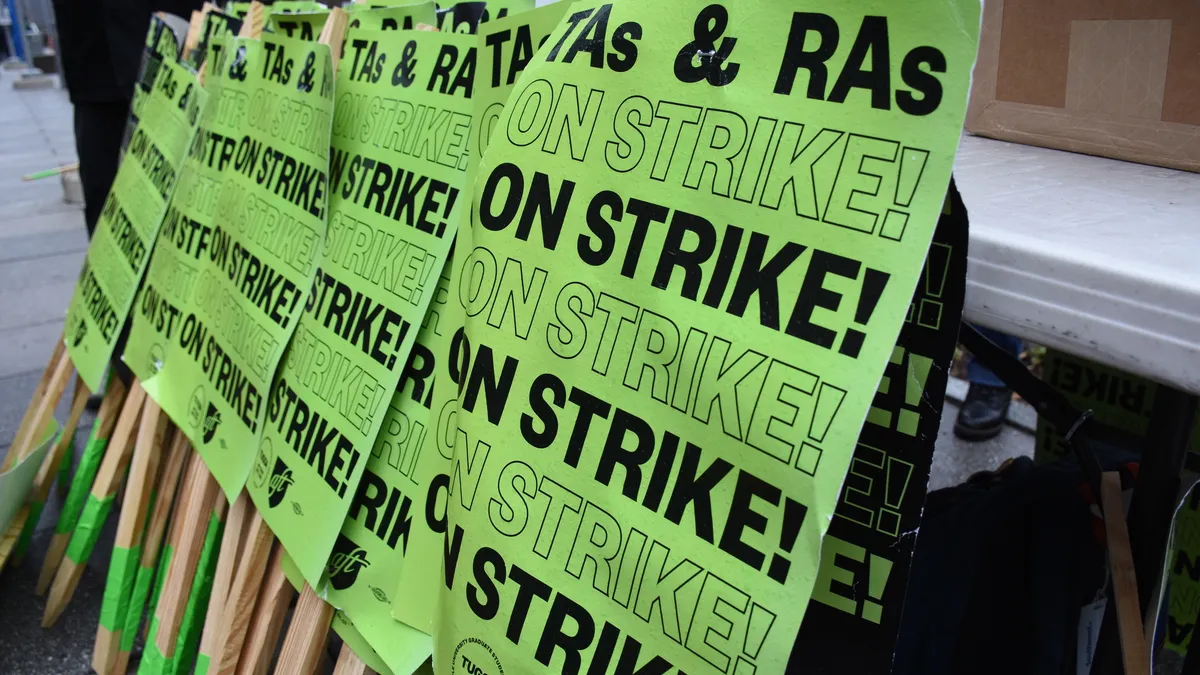Graduate student unions nationwide have been in the spotlight in recent months as some voted to strike, buoyed by a recently successful movement at the University of California system.
The UC system’s graduate student and teaching assistant strike, which ended in late December, drew attention for being the largest ever in American higher education. But other campaigns have been in the news after turning nasty, like Temple University’s recent refusal to pay tuition assistance and health care benefits for its striking academic workers. While Temple eventually restored their health care, the workers' action continued.
Graduate student unions' efforts at public colleges have been ramping up for decades, while those at private colleges were blocked from striking for years until 2016, when the National Labor Relations Board ruled teaching and research assistants at those institutions have the right to unionize.
Below, we summarize potential grad student union action at three colleges, including a case that threatens the 2016 NLRB decision.
Temple University
Temple University’s graduate students announced Monday they had ratified a contract 344-8, ending their six-week strike. They struck the deal with officials last week.
The union faculty members overwhelmingly rejected an initial arrangement in February. The new agreement, the union said, makes “significant movement” on all four of its major demands, including wages and leave policies.
The agreement will boost graduate students’ minimum salary to $24,000 annually in the contract’s initial year, rising to $27,000 by the fourth year. The union had sought average pay of more than $32,000 a year.
Temple, a public institution in Pennsylvania, also said it will pay part of graduate students’ dependents health care insurance subsidies — a first in the union’s 20-year existence.
Not every graduate student union member participated in the strike.
Other employee unrest looms, however. The faculty union, the Temple Association of University Professionals, is threatening a no-confidence vote against the institution’s president, provost and governing board chair.
Employees have been enraged by what they deem a lackluster response to public safety concerns. These fears were in part set off by a fatal shooting of a student in 2021 and exacerbated by another shooting this year, this time of a campus police officer.
Duke University
Duke University, the prominent private nonprofit institution in North Carolina, doesn’t actually have a graduate union, despite the 2016 NLRB ruling allowing such organizing.
The university’s academic workers tried to form a union after the national board authorized them at private colleges. However, those workers voted against unionizing in 2017. Duke had not acknowledged a potential union, maintaining to a regional labor board that year that its graduate students were not employees.
Now, Duke is trying the same argument once again, which amounts to an effort to overturn the NLRB decision. This comes as its graduate students again attempt a vote to unionize.
Graduate students behind the effort are accusing Duke of “union-busting tactics” and have called on administrators to bargain with them.
In September, Duke said it would give all active doctoral students an extra, one-time $1,000 stipend, double the amount it initially announced in June.
Rutgers University
Two unions representing Rutgers University faculty, graduate students, adjunct instructors and other academic employees voted this month to authorize negotiators to call a strike.
About 80% of the unions’ memberships cast a ballot, with an overwhelming 94% majority voting in favor of potentially authorizing a strike.
If the academic workers launch a strike, it would be the first in Rutgers’ 250-year-plus history.
Officials at the New Jersey public land-grant university have been trying to negotiate since last summer.
Union representatives said the vote authorizing a strike does not mean one is inevitable.
“But the vote is a show of unity and strength that we hope the administration recognizes,” the organizations said. “The ball is in their court. They can decide to keep us in our classrooms, libraries, and labs by responding to our proposals with serious offers that meet the urgent needs we’ve identified.”
Jonathan Holloway, Rutgers’ president, said in a statement earlier this month that the university would continue to hammer out a deal. Holloway said he directed most central administrative units to cut their budgets as much as 9.5% as the institution braces for a financial shortfall and increased salaries that will result from union negotiations.
The university has offered a proposed contract with a 10.75% wage hike over four years, as well as a one-time lump sum, equal to 1% of base salaries in fiscal 2023.
The unions have sought 5% annual salary increases for full-time faculty for three years, and a 4.75% increase in the fourth year.























